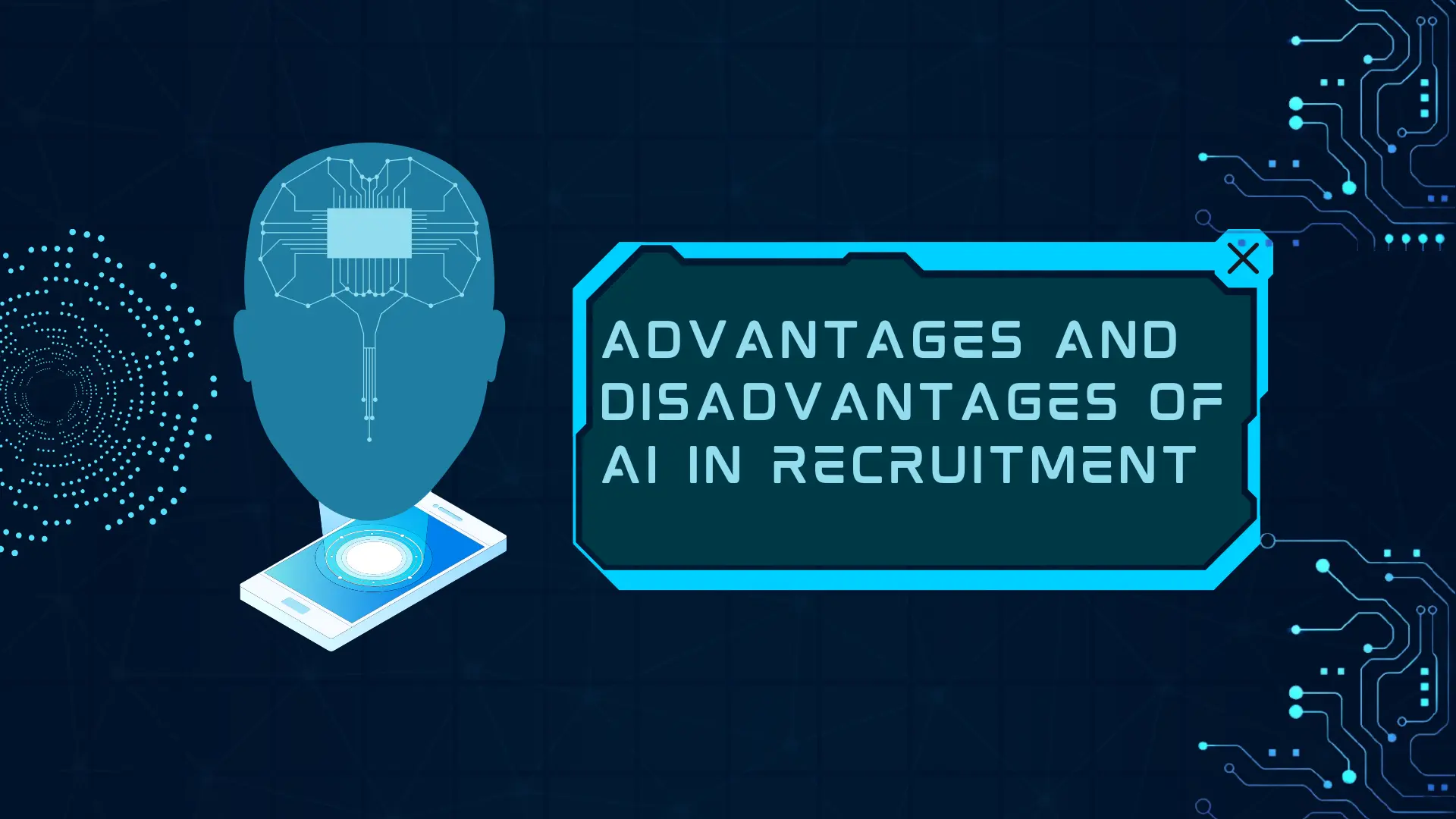
Advantages and Disadvantages of AI in Recruitment
AI in recruitment offers efficiency, better candidate matching, and reduced bias. It automates tasks, enhances candidate experience, and enables scalability. However, it lacks human touch, potential algorithmic bias, data reliance, high implementation costs, and privacy and security concerns. Balancing AI's capabilities is crucial.

AI has transformed a variety of industries, including recruitment. The incorporation of AI into recruitment has resulted in new efficiency, but it also offers some obstacles. Understanding the benefits and drawbacks of AI in recruitment is critical for organisations seeking to improve their hiring procedures. This article discusses how AI is transforming the recruitment sector, as well as the potential pitfalls to consider.
Advantages of AI in Recruitment
- Time and Cost Efficiency: One of the most significant benefits of AI in recruitment is the time and cost savings it provides. Traditional recruitment tactics can be time-consuming and resource-intensive. Routine processes, such as reviewing resumes and shortlisting prospects, can be automated using AI techniques, resulting in a significant reduction in hiring time. For example, AI-powered systems may sift through hundreds of resumes in minutes, identifying the most qualified candidates based on predefined criteria.
This automation enables recruiters to concentrate on more strategic duties, such as candidate engagement and final decision-making, rather than being bogged down by administrative work. Companies save time and money by shortening the recruitment cycle, which improves the overall efficiency of the operation. - Improved Candidate Matching: AI systems can analyse large volumes of data to better match people to job requirements. AI systems interpret job descriptions and resumes more accurately than traditional keyword-based methods. This results in more accurate applicant matching, ensuring that recruiters are presented with individuals that are a good fit for the position.
AI-powered platforms can also take into account soft skills, work culture compatibility, and career trajectory, resulting in higher overall hire quality. AI in recruitment can help firms decrease mismatches and increase employee retention. - Enhanced Candidate Experience: The application of AI in recruitment can greatly improve the candidate experience. AI-powered chatbots, for example, respond immediately to candidate enquiries, keeping job seekers interested throughout the hiring process. These chatbots may help schedule interviews, answer frequently asked questions, and walk prospects through the application process.
AI makes candidates feel valued by giving real-time interactions, resulting in a more positive experience, even if they are not hired. A positive applicant experience improves corporate branding and raises the chances of hiring top talent. - Reduction in Human Bias: Another big advantage of AI in recruitment is that it reduces human prejudice. Human recruiters may have unconscious biases that influence their decisions, even if they do not want to. When properly constructed, AI systems can assist alleviate this by emphasising objective factors such as abilities, certifications, and experience above personal qualities.
This results in a more varied and inclusive workforce, since AI techniques ensure that candidates from all backgrounds are judged fairly based on their ability rather than criteria such as gender, colour, or age. - Scalability: AI can easily handle massive numbers of applications for major organisations that recruit often. AI recruitment solutions are capable of processing enormous data sets, evaluating several candidates at once, and managing multiple vacancies concurrently. This scalability is especially useful for businesses wishing to grow quickly or employ for high-volume positions, since AI can retain efficiency without sacrificing quality.
Disadvantages of AI in Recruitment
- Lack of Human Touch: One of the biggest drawbacks of AI in recruitment is the lack of a human element in the hiring process. AI-powered systems rely primarily on data and algorithms, which might make the process appear impersonal to candidates. Recruitment is typically about developing relationships, and AI solutions may not deliver the same level of personal interaction as human recruiters.
Some candidates may feel alienated from the process or believe they are being evaluated only by a machine, which could have a negative influence on their image of the organisation. In some circumstances, the lack of empathy or emotional intelligence in AI systems can result in a negative candidate experience. - Potential for Bias in Algorithms: While artificial intelligence has the potential to minimise human bias, it is not immune to bias either. AI systems are only as objective as the data they are educated on. If the historical data used to train the AI is biassed, such as favouring specific ethnicities or educational backgrounds, the AI may perpetuate or even amplify those biases. For example, if a company's previous hiring practices indicated a preference for individuals from a specific university, the AI may prioritise those prospects in future hiring decisions.
As a result, organisations must constantly evaluate and improve their AI systems to ensure that biases are not incorporated in the algorithms. - Over-reliance on Data: AI in recruitment is primarily reliant on data. However, statistics may not always provide a whole picture of a candidate's capabilities. For example, a candidate with unusual work experience or career breaks may be disregarded by an AI system simply because their profile does not match standard success criteria.
Furthermore, AI tools can occasionally misinterpret data. A candidate's CV may contain keywords that fit the job description but lack the necessary depth for the position. This overreliance on data may result in potentially qualified candidates being overlooked or unqualified individuals being prioritised. - High Initial Costs: The initial expenditures of implementing AI-driven recruitment tools can be significant. While AI might save money in the long term by optimising processes, the initial setup, software, and training required to effectively employ AI tools can be expensive for small businesses or startups.
Furthermore, AI systems require constant upgrades and maintenance to ensure maximum performance, which adds to the overall expenditures. Traditional recruitment approaches may still be more viable for businesses who cannot afford to invest in AI. - Privacy and Security Concerns: The use of AI in recruitment entails gathering and analysing vast volumes of personal information. This poses issues of privacy and data security. If not handled properly, sensitive candidate information may be vulnerable to breaches or misuse. Companies must ensure that they adhere with data protection rules such as the GDPR and CCPA while using AI techniques to collect candidate data.
Ensuring secure candidate data storage and processing is crucial for avoiding legal ramifications and maintaining candidate trust.
Conclusion, AI in recruitment has numerous advantages, including better efficiency, improved candidate matching, and less human bias. However, it has significant drawbacks, including the possibility of algorithmic bias, a lack of personal touch, and privacy concerns. As AI evolves, organisations must strike a balance between automation and human control to ensure that their recruitment processes are fair, efficient, and engaging.
Understanding the benefits and drawbacks of AI in recruitment allows businesses to make informed decisions about how to use AI tools while minimising potential dangers. Finally, integrating AI power with human knowledge may be the most effective way to optimise the recruitment process.


